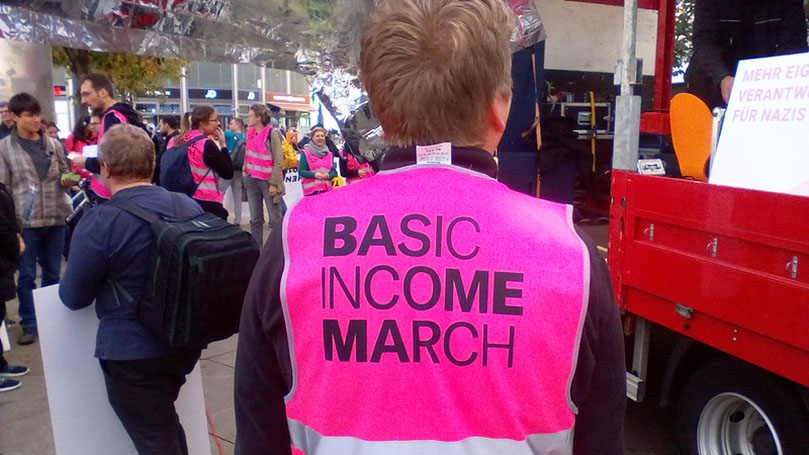
UBI stands for Universal Basic Income. It means a governmental public program for a periodic payment delivered to all on an individual basis without a means test or work requirement. The incomes would be:
- Unconditional: A basic income would vary with age, but with no other conditions or distinctions.
- Automatic: No re-application or registration required.
- No means tests: Basic incomes would not change with earnings.
- Individual: Not based on a couple or household.
- A right: Every legal resident would receive a basic income.
The basic income concept can be implemented nationally, regionally, or locally, or in combination with other programs. Andrew Yang made UBI the centerpiece of his presidential campaign. His motivation was primarily a Silicon Valley defense against accusations that artificial intelligence and automation would displace millions of jobs. Dr. Martin Luther King Jr. put forward the idea in the 1960s as a direct cure for poverty. The pandemic and economic collapse have highlighted the proposal as perhaps the only one that can maintain the ability of working people to stay home for the lengths of time required to survive the pandemic.
The principal economic argument against UBI (coming from the Wall Street Journal, for example) is that it is inherently inflationary, since only labor/work creates real value, and putting free cash in the market thus in theory distributes more dollar bills among the same commodities, an incentive toward inflation. That is, store owners would raise their prices, knowing their customers have more cash on hand.
The reality is much more complex. The evidence from a number of direct income programs around the world and in the past in the US shows no direct inflationary effects. Welfare is an example of direct payments. The GI Bill, tax credits for child care, and other public goods are too. Another form of direct income is the “negative tax” proposed by Milton Friedman, the conservative “Chicago School” economist. It is true that direct payments, if excessive, have the potential to be inflationary. However, in real life, it is not true that direct payments will result in zero increase in real economic value. Most people will find a creative use for the money: education, property improvements, and much more. Some will for sure use the income to buy dope. But not most. Plus—the goal, as Dr. King enunciated, is to rid society of poverty—whose impact is far worse than a bump in the marijuana market.
Nonetheless, it is always amusing to observe Wall Streeters applying the labor theory of value (Adam Smith, Karl Marx, etc.) to oppose raising working-class incomes.
The other anti-UBI argument is the staple right-wing one that “free money” is a disincentive to work, which always sounds odd coming from the stock dividend class. Since Johnson’s civil rights and Great Society legislation, there has been a political and cultural backlash against the welfare model, especially since the era of austerity launched by Reagan in 1980. The purpose of that “launch,” indeed, was to destroy the Johnson and Roosevelt legacies. And Andrew Yang did not make a lot of progress.
The “Employer of Last Resort” Model
An alternative to UBI is a classic one of John Maynard Keynes: Roosevelt’s National Recovery Act of 1933 implemented it, and it was further developed theoretically by Hyman Minsky and other “post-Keynesians” as a remedy for both mass or permanent unemployment and financial instability. It is called “employer of last resort,” a program in which the federal and state governments become the employer. The Civilian Conservation Corps and other public-works programs of the first FDR administration are examples. Workers in some programs were given “three hots and a cot” and $1 per day, 75 cents of which was sent to the worker’s family.
A key criticism, and feature, of such programs is the same as pointed at UBI: Whatever wage the government pays for “employer of last resort” work will become a market wage floor and inevitably cause wages to rise, and thus cause a wage-price inflation spiral. This was a potent argument in some US labor circles, especially at the end of World War II, when wage cuts via inflation helped cause the biggest strike wave in US history. But for bankers, inflation is doubly evil because it deflates the value of loans and returns on investment. For the corporate reactionaries, it is much better to leave the “wage floor” at starvation and death, always attacking even unemployment programs.
Many nations, typically “more socialist” ones, have successfully experimented with the “employer of last resort” approach during recessions, and socialist nations like China and Vietnam use many and various national service programs that implement this concept.
However, “employer of last resort” can also generate some division. The American Federation of Labor, for example, opposed the New Deal programs based on “employer of last resort” on the grounds that the floor wage could undercut trade union labor performing similar work in the private sector. The CIO, representing mass-production workers for whom unemployment was a constant threat, and who possessed very little labor market protection from poverty, supported it. While the programs did not inflict any harm on actual AFL member employment, the association’s fears were not entirely unfounded, and its opposition was not the same as the corporate resistance. The latter feared more the inevitable pressure to raise the effective public minimum wage reflected in the “last resort” work—a gradual socialization of the labor market.
From a working-class point of view, there are pros and cons with both remedies as stand-alone solutions to unemployment and poverty. In fact, the best approach is a mix of both programs: a basic income reward in exchange for national or public service. The highly popular GI Bill, which enabled soldiers coming home after World War II to enroll in college tuition-free, is one such program. The combination of service and reward is likely to work better politically. Flexibility is essential for a smart socialist approach. During the pandemic when we’re required to stay at home, the public-works, “employer of last resort” approach is of little use. Basic income is mandatory for the immediate future, in whatever form.
The socialist approach is the “all hands on deck” approach with the most flexibility balancing science, reward, and cost.
Lastly, who would not support UBI to keep these guys playing “All Around the World”?
Image: Patrick Maynard, Creative Commons (BY-SA 2.0).


 Join Now
Join Now